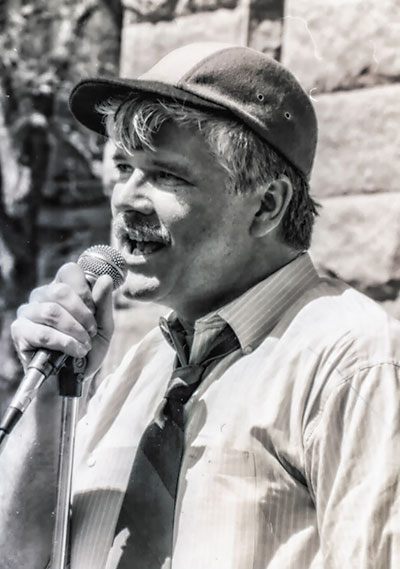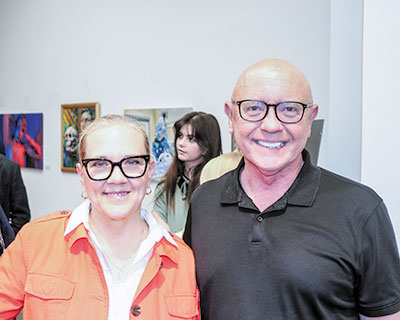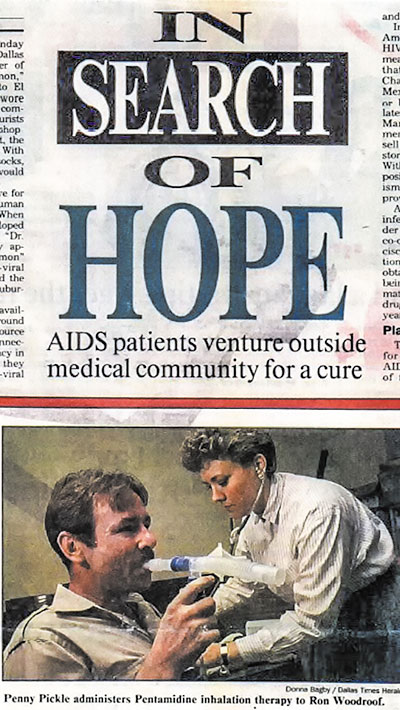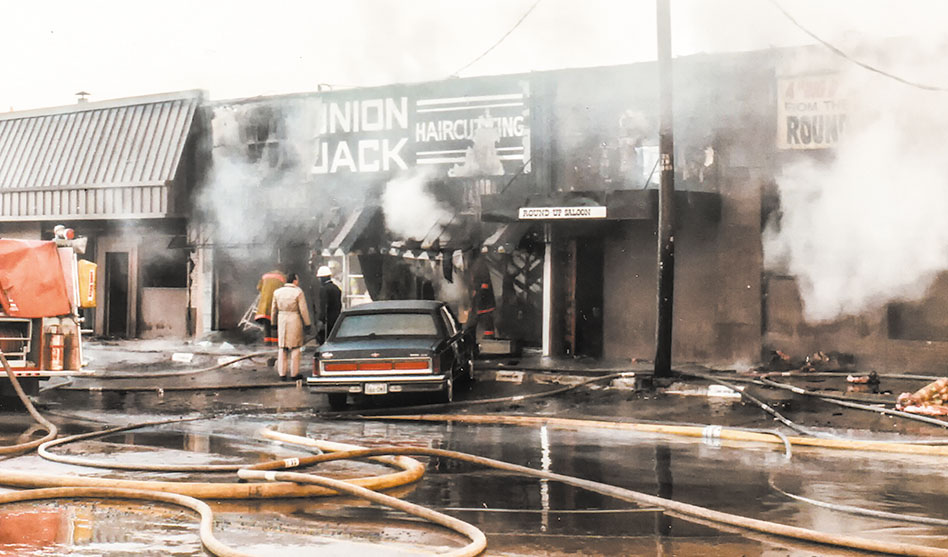A fire, above, destroyed the AIDS Resource Center offices in February 1989.
The agency was founded by lesbians and gays because no one else was going to help during the AIDS epidemic
DAVID TAFFET | Senior Staff Writer
taffet@dallasvoice.com
As Resource Center celebrates its 40th anniversary this year, kicking off the festivities with Toast to Life on April 1 at The Empire Room, it seems a perfect time to take a look back at when and how and why the agency began. Today, Resource Center is well known and well respected not just in the LGBTQ community but across North Texas and even around the U.S. But 40 years ago, it started out as a band of angry, determined and compassionate lesbians and gay men willing to do whatever they had to do to fight AIDS and help its victims and, along the way, fight for LGBTQ equality, as well.
Resource Center started as the offspring of what was then known as Dallas Gay Alliance, which had gotten its start about 10 years earlier in response to the threat posed by anti-LGBTQ extremist Anita Bryant. Miami had passed the first gay rights ordinance in the south, and Bryant campaigned for its repeal. It became apparent that to continue to make legal gains, LGBTQ communities across the county were going to have to organize.

John Thomas, below, was the center’s first executive director. (Dallas Voice file photos)
So activists in Dallas created Dallas Gay Alliance in 1975 to address issues like police raids on bars and to support candidates for local offices who understood the issues LGBTQ people faced.
Then, on June 5, 1982, the New York Times printed an article declaring that AIDS had arrived in the U.S., although it was at the time referred to as GRID — Gay-Related Immune Deficiency. Young gay men in New York and San Francisco, and smaller clusters found in a few other major cities, were dying of Kaposi’s Sarcoma, a rare cancer until then never seen in men younger than 50, and of pneumocystis, a rare pneumonia.
DGA leaders first debated whether this syndrome would ever hit Dallas. Then the discussion turned to “Sure it hit Houston. But will it come to Dallas?”
But by 1983 the question was no longer if but when it would come to Dallas.
Planning for a non-profit organization to address what had only recently been dubbed Acquired Immune Deficiency Syndrome began before the first cases of AIDS were even confirmed in Dallas. One thing leaders in the LGBTQ community were seeing around the country was the gay and lesbian community better get ready because no one else was coming to help.
DGA was a political organization, but it had been creating and spinning off new organizations. A new non-profit dealing with AIDS was one of those spin-offs. Organizers decided it would be a non-political group that could accept tax-free donations and would be housed in the space on Cedar Springs Road that DGA had recently rented — approximately where TapeLenders is now.
Then there was the name. From the beginning, the new organization was commonly referred to as the AIDS Resource Center. But to do the education and outreach and medical care — surely they’ll find a cure in the next few months, everyone thought — donations would be needed. And those donations just weren’t coming in.
John Thomas — then AIDS Resource Center board member before he was hired as its first executive director — knew why: People with money just couldn’t write a check with the word AIDS on it. Because AIDS was associated with, well, “those kind of people.”
So the organization needed a new name. And the name they came up with was a doozy: The Foundation for Human Understanding. Wealthy Highland Park donors could write a check for human understanding when they couldn’t write one to AIDS, Thomas used to say when asked about the awful and deceptive name.
But then that name disappeared around 1999 when a Christian organization in Oregon called the Foundation OF Human Understanding sued Resource Center for using it. Although they were a newer organization, they had trademarked the name, something Resource Center hadn’t done.
The board was divided over what to do. Some wanted to go through with the lawsuit on principle. But others reminded everyone that the name was confusing, that donors now were writing checks to AIDS organizations, and everyone hated having to explain that the Foundation FOR Human Understanding was the AIDS Resource Center and what, by then, was also commonly referred to as the Gay and Lesbian Community Center.
So Resource Center surrendered the name to the Christian organization that thought suing an AIDS agency was a great idea.
FOOD PANTRY
The food pantry began as a shelf in Crossroads Market on Cedar Springs Road. A simple sign suggested customers leave a can of food or, if they needed to, take a can of food. The need, along with donations, quickly outgrew the shelf.
A warehouse space behind Resource Center on Cedar Springs — actually built as a separate building but connected to the main store through a hallway — was available to rent. So Resource Center rented the space, took over management of the food pantry and hired Mary Franklin and Bill Hunt to run it.
Together, Franklin and Hunt revolutionized the way food pantries worked. Until then, a client would go to a pantry and be handed a bag of food. But that didn’t make sense to Franklin and Hunt. What if the client didn’t like something in the bag? They would just throw that item out, and that was wasteful.
The pantry served mostly gay men, they reasoned, and gay men shopped. So the food pantry was set up like a store. Clients came in, browsed the aisles and took only what they wanted. The North Texas Food Bank was so impressed with the operation that for years they brought operators of other pantries over to see this revolutionary new concept.
When the food pantry outgrew that space, it moved to Denton Drive Cutoff next to RetroActive, Resource Center’s thrift shop that raised money for the center.
After the new Community Center at 5750 Cedar Springs opened in 2016 and the old buildings were renovated into the Health Campus, the food pantry moved to the building on Reagan at Brown.
PENTAMIDINE MIST
In the late 1980s, G*U*T*S — the Gay Urban Truth Squad, Dallas’ version of ACT*UP — was demonstrating outside Parkland Hospital over the lack of care for AIDS patients, including not offering the only drug available at the time — AZT. To counter some of that lack of care, Resource Center opened the Nelson Tebedo
Clinic for AIDS Research on Cedar Springs to run drug trials and dispense any medications available.

Penny Pickle Krispin and Ron Allen
At that time, pentamidine mist was showing promise as a preventive treatment for pneumocystis. The problem was, it wasn’t yet FDA approved for that purpose. In January 1988, Parkland agreed to conduct a study of the treatment, but that study never happened. And Resource Center staff knew it wasn’t going to happen.
So two nurses — Pam Clayton and Penny Pickle Krispin through their company Careline — volunteered to administer the treatment at Resource Center’s clinic. By the end of January, the new “breathing room” at what was to become the Nelson Tebedo Community Clinic was up and running. The nebulizer used for the treatment was purchased by DGA.
Krispin said they purchased the drug from a regular supplier because it was on the market, approved for other uses. The treatments were given one afternoon a week for about a year to about 80 men a week. Among them was Ron Woodroof, known for creating the Dallas Buyer’s Club and the subject of the 2013 film of the same name.
Krispin said the clinic continued for about a year, stopping only when the antibiotic Bactrim proved to be an effective treatment for PCP.
“All those sweet, sweet men,” Krispin said through tears, recalling those years. “Breaks my heart. Nothing was more fulfilling” than offering them the treatment they needed.
FIRE
On Feb. 22, 1989, an early morning fire destroyed the AIDS Resource Center and DGA on Cedar Springs Road as well as the neighboring Round-Up Saloon and the men’s clothing store Union Jack.
The arson fire went unsolved until Dale Wesley Biddy walked into the Dallas Voice office four months later and confessed to editor Dennis Vercher that he set the fire to cover up theft of DGA’s computers. Current Dallas Voice editor Tammye Nash, then the Voice’s only staff reporter, was in the office that day and recalls Biddy coming into the office.
 “I very clearly remember him walking in the office in a brown suit with a yellow shirt and brown tie and asking to speak with Dennis. And then a few minutes later Dennis came running out and grabbed the camera because ‘This guy just confessed to setting the fire,’” Nash said.
“I very clearly remember him walking in the office in a brown suit with a yellow shirt and brown tie and asking to speak with Dennis. And then a few minutes later Dennis came running out and grabbed the camera because ‘This guy just confessed to setting the fire,’” Nash said.
“Dennis got [Biddy] to stand in front of a blank wall in our offices there on Wycliff and took four or five shots of him standing there staring into the camera,” she added. “That was the photo everyone used in reporting about the fire and his confession.”
Biddy, a gay man who was on parole for arson, admitted to setting the Cedar Springs fire as well as four others.
When he left the Dallas Voice offices, he headed to Farmers Branch police headquarters, where he turned himself in for a burglary and arson there. Irving police filed charges against him, and, in Dallas, he was charged with the Resource Center fire as well as at least two others including one at Herrera’s on Maple Avenue.
DGA had been using the sanctuary of the MCC Dallas church on Reagan at Brown streets for its monthly membership meetings. They needed the large space because the monthly speakers usually attracted 50 to 100 people per meeting.
The church had outgrown that property, and the congregation was meeting for the time being in a building on Maple Avenue at Hudnall Street while waiting for the new Cathedral of Hope sanctuary to be built. The church had its property at Reagan and Brown up for sale. Resource Center leaders began discussing the idea of buying that property.
Joe Desmond, secretary for both the DGA and Resource Center boards, kept assuring board members who were worried about taking out a mortgage of more than $200,000. “Don’t worry about it,” he promised. “It’s covered.”
Desmond and his partner, Ken Flanagan, both died of AIDS in 1994, leaving their house, car and insurance to Resource Center. That gift more than paid off the building. For years, the main building at Reagan at Brown, now known as the Health Campus, was known as the Desmond Building.
About that same time, leaders of DGA and Resource Center decided it was time to spin off the Foundation for Human Understanding into its own fully independent organization. After 10 years, Resource Center had grown into a much larger agency than its parent organization.
At the time, DGA was actively working with Equality Texas, then known as the Lesbian and Gay Rights Lobby of Texas, in trying to pass a hate crime law. Resource Center, for its part, remained focused on improving the lives of people living with HIV while expanding its scope by turning its new buildings on Reagan and Brown into an LGBTQ community center.
Today, Resource Center offers a variety of services including dental care for people with HIV, a medical clinic open to all, counseling services and programs for women, Black LGBTQ people, transgender people, youth and LGBTQ seniors, including housing — and more. In addition, Resource Center has been at the forefront of advocacy on trans issues and LGBTQ equality.
JOHN THOMAS
John Thomas isn’t just a footnote to this story. He was not only the first executive director of the center, he was one of its most generous regular contributors.
For more than a decade, John Thomas was Resource Center. Much of the information in this story comes from Thomas, who met weekly with Dallas Voice Senior Editor Dennis Vercher, whose accounts were used in this history.
When Thomas died of AIDS in 1999 Dallas lost a giant. Not only was he a creator and founder of Resource Center, but also of Black Tie Dinner, The Turtle Creek Chorale, Legal Hospice of Texas and the LGBT Victory Fund.
Thomas was a plaintiff in Morales v. Texas, the lawsuit that resulted in the Texas sodomy law being declared unconstitutional. And he was a principle fundraiser for Cathedral of Hope.
But what most people who knew Thomas miss most about him were his wonderful, warm hugs.
Toast to Life – 80s Icons celebrating Resource Center’s 40th anniversary takes place on April 1 at 7 p.m. at the Empire Room, 1225 N. Riverfront Blvd. Michael Urie emcees. Tickets are $200 at one.bidpal.net/toasttolife2023.














Thank you David Taffet for this article. I waxed nostalgia.
David, thanks for sharing this important story of the Resource Center and the Dallas LGBTQ community’s early beginnings. Congratulations, Resource Center, on forty yeas of service to Dallas.